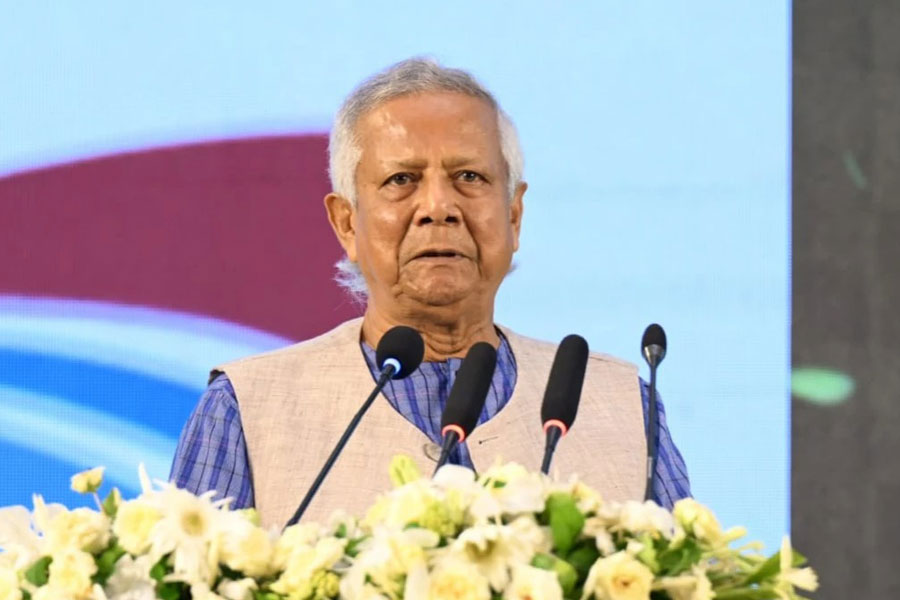
Published :
Updated :

Highlighting the importance of a healthy lifestyle, Chief Adviser Professor Muhammad Yunus on Wednesday urged all to avoid destroying nature and join hands in planting trees and stopping production and use of single-use plastic products to enjoy this beautiful world and creating a beautiful environment for the generations to come.
"Plastic is a poison. Not just for people, but for everything in this world. We are not taking it seriously because it's happening slowly and gradually. Let's solve it. Let's save us from this poison," he said.
Prof Yunus made the remarks while speaking as the chief guest at a function marking the 'World Environment Day' which originally falls on June 5 at Bangladesh-China Friendship Conference Centre.
The Chief Adviser said protecting the environment should be a citizen-led movement, not just relying on the government.
"It's my environment. I must protect it. There is no alternative to it. We must remember that if we want to survive, we must protect the environment," Prof Yunus said, highlighting the importance of awareness at an individual level.
He said there should be a drive to stop tree cutting like the campaign for massive tree plantation across the country.
Prof Yunus hoped that the new generation would be able to see pollution-free rivers and green forests close to Dhaka.
"Young people inspired us to dream of a new Bangladesh. This young generation is the most powerful and creative power in the world," he said.
Prof Yunus urged the young generation to play an effective role in addressing the challenges of climate change and protecting the environment from pollution.
The Chief Adviser also urged all the citizens of the country to stop using single-use plastic products. "We must be free from self-destructive thinking processes. For economic benefit, the environment cannot be harmed," he said.
Describing growing dominance of plastic products, Prof Yunus said the people will suffer a certain defeat against plastic if they do not want to change it seriously.
"There will be no question of avoiding use of plastic products if their production is stopped. That's the root," he said.
Prof Yunus said humans are destroying nature but they could not realise that nature also has a destructive mode.
Highlighting the adverse impacts of plastic on the planet, he said the plastic is accelerating climate crises, natural disasters and biodiversity destruction.
The Chief Adviser said the country's waterbodies and biodiversity are being destroyed for lack of proper plastic management.
About the longevity of plastic in nature, he said everything has a lifespan but the plastic is such a thing that has no death.
Describing the harmful impacts of microplastic, Prof Yunus said, "If we do not leave plastic use, destruction will not leave us.....we are on the suicidal path as the indiscriminate use of plastic and polythene is everywhere."
Prof Yunus recalled the martyrs of the July uprising and sought early recovery of those who were injured in the movement.
Building Green Bangladesh
Later, Prof Yunus inaugurated the Environment Fair-2025' and the 'National Tree Plantation Campaign and Tree Fair-2025' at the function.
He also distributed the National Environment Award, the National Wildlife Conservation Award and the National Tree Plantation Award among the recipients in recognition of their outstanding contributions to protection of environment and conservation of wildlife.
Environment, Forest and Climate Change Adviser Syeda Rizwana Hasan and Environment Secretary Dr Farhina Ahmed also spoke at the event.
The Environment Fair will continue from June 25 to June 27, while the Tree Fair will continue until July 24.
Both fairs will remain open for all from 9 am to 9 pm every day.
This year's theme for the Tree Plantation Campaign is: "Let's Plant in a Planned Way, Build a Green Bangladesh."
Earlier in a message marking the World Environment Day, the Chief Adviser urged all to come forward for the successful implementation of the government's initiative to protect St Martin's Island, the only coral island in Bangladesh.
"I believe that with the combined efforts of all, we will leave a prosperous Bangladesh full of pristine environment and biodiversity for future generations," he said, adding that the government has taken initiatives to limit tourism and create alternative employment opportunities for local residents to protect and restore the biodiversity of the ecologically critical island.
"I am happy to know that 'World Environment Day' is being celebrated in Bangladesh like other countries of the world to increase public awareness about environmental protection," Prof Yunus said, noting that this year's theme of World Environment Day, 'Ending Plastic Pollution', set by the United Nations Environment Programme (UNEP), is very significant.
The Chief Adviser said the use of plastic products has increased dramatically in the past decade.
The multifaceted and uncontrolled use of plastic materials, especially the excessive production, indiscriminate use and mismanagement of single-use plastic, is causing serious damage to the environment, he said.
Strict control of plastic pollution has become essential to ensure the protection of our environment and environment, Prof Yunus said.
The current interim government has taken various steps to control plastic pollution to protect the environment and public health, he said.
Regular monitoring activities are continuing nationwide to stop the production and use of polythene shopping bags, Prof Yunus said.
Special initiatives have been taken to invent, approve and introduce environmentally friendly alternatives to polythene bags, he said.
Activities are underway to stop transboundary plastic pollution and projects are being implemented for the proper and environmentally friendly management of plastic waste and marine litter, Prof Yunus said.
In addition, he said, work is underway to formulate EPR (Extended Producer Responsibility) guidelines under the 'Solid Waste Management Rules, 2021', where producers will collect and manage plastic waste at their own risk.
Prof Yunus said many regions of Bangladesh, a land of natural beauty, are currently facing environmental and ecological crises.


 For all latest news, follow The Financial Express Google News channel.
For all latest news, follow The Financial Express Google News channel.